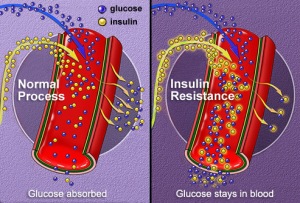Hypothyroidism, high cholesterol, fatigue and poor memory are just a few of the conditions possibly caused by a single hormone malfunction! With its discovery in 1923, insulin research has come a long way and it is now being linked to the onset of a myriad conditions and syndromes.
Insulin is a hormone known for its role in regulating carbohydrate and fat metabolism in the body. It causes cells in the liver, muscle, and fat tissue to take up glucose from the blood, storing it as glycogen in the liver and muscle. Insulin’s role however is not limited to these actions. Through its many interactions with other hormones it is known to affect and be a cause for such syndromes & conditions as:
- Type II Diabetes
- Memory and cognition (possibly Alzheimer’s recently coined “Type III Diabetes”)
- Skin Health (acne)
- Poly Cystic Ovarian Syndrome (PCOS)
- Fatigue
- Thyroid Health
- Vascular Health
- Metabolic syndrome (combination of high blood pressure, high cholesterol, central obesity and high fasting glucose)
These conditions arise as a result of insulin resistance in non-diabetic (possibly pre-diabetic) and -seemingly- otherwise healthy individuals.
What Is Insulin Resistance?
Insulin resistance precedes the development of type II diabetes and also helps maintain the diabetic state. As the name implies insulin resistance is your body’s inability at the utilization of insulin.
An analogy, imagine this: you have just come back from a grocery shopping trip and are loaded with bags in your arms (this indicates the glucose surge in your system after a meal). You  however need a way to take all these inside your home but your door is of course locked (likewise glucose needs to be taken up by your cells by carriers). You need to ring the door bell in the hopes that someone will help you carry all this inside (this is where insulin comes in signaling the gate-keepers to allow glucose inside the cells). But there’s a party going on inside and no one can hear you (this is what happens with insulin resistance). Everyone might be starving inside but they have no idea that you’re waiting outside to take this all in because it’s so loud! Similarly your cells when exposed to a constant high stream of insulin gradually become deaf to its call. They no longer hear its ringing and as a result your body is forced to produce more and more insulin in order to lower your blood sugar.
however need a way to take all these inside your home but your door is of course locked (likewise glucose needs to be taken up by your cells by carriers). You need to ring the door bell in the hopes that someone will help you carry all this inside (this is where insulin comes in signaling the gate-keepers to allow glucose inside the cells). But there’s a party going on inside and no one can hear you (this is what happens with insulin resistance). Everyone might be starving inside but they have no idea that you’re waiting outside to take this all in because it’s so loud! Similarly your cells when exposed to a constant high stream of insulin gradually become deaf to its call. They no longer hear its ringing and as a result your body is forced to produce more and more insulin in order to lower your blood sugar.
Diabetes as a result of Insulin Resistance
On the surface of the cells in your body are insulin receptors, which act like little doors that open and close to regulate the inflow of blood sugar.
After many years of consuming a high-carbohydrate diet, your cells have been bombarded with so much insulin that these doors begin to malfunction and shut down.
With fewer doors open, your body needs to produce even more insulin to push the glucose into the cells. More insulin causes even more doors to close and as this vicious cycle continues, a condition called “insulin resistance” sets in.
When your body can no longer produce enough insulin to push the blood sugar into the cells, type 2 diabetes results. It is simply an extreme case of insulin resistance.
The key point for you to understand is that your energy, wellness and longevity are primarily dependent on improving the sensitivity of your cells to insulin – how well your cells open and close the doors and clear sugar from the blood.
Let’s look at one of the many effects of insulin resistance on health:
Insulin Resistance and Thyroid Health
Although your thyroid gland is responsible for the production of thyroid hormones, it is only in peripheral tissues and mainly your liver where the inactive T4 hormone is converted into the active thyroid hormone T3. While many factors can influence the conversion of T4 to T3 (or reverseT3, also an inactive hormone) the proper functioning of the liver appears to be a major factor in this process. Due to the fact that insulin resistance eventually leads to the development of Non-alcoholic Steatohepatitis (NASH; when fat is deposited in the liver) which causes an overburden on the liver, the production of T3 from T4 in the liver is reduced leading to lowered metabolism (1-4).
Insulin resistance is reversible and completely preventable. Due to the fact that insulin is affected by many factors, there are also just as many ways of tackling insulin resistance. Among these are many beneficial herbs, nutritional supplements (certain vitamins & minerals), lifestyle factors (stress management tools and activity level), as well as eating habits proven to prevent, as well as reverse insulin imbalances.
Please seek the help of a qualified and licensed health professional if you have any of the above mentioned conditions and never self-treat. These articles are for informational purposes only and are not meant to help diagnose or treat any individual dis-ease.
References:
- Adams LA, Angulo P (2006). “Treatment of non-alcoholic fatty liver disease”. Postgrad Med J 82 (967): 315–22
- Larter CZ, et al. A Fresh look at NASH pathogenesis. Part 1: the metabolic movers. J Gastroenterol Hepatol. 2010 Apr;25(4):672-90.
- Maheshwari A. Thuluvath PJ. Endocrine diseases and the liver. Clin Liver Dis. 2011 Feb;15(1):55-67.
- Choudhury J, Sanyal AJ. Insulin resistance and the pathogenesis of nonalcoholic fatty liver disease. Clin Liver Dis. 2004 Aug;8(3):575-94, ix.

I got what you mean , saved to fav, very decent website .
Thank you for your kind comment!
Perfect piece of work you have done, this internet site is really cool with fantastic information.
Thank you for your encouraging words! I’m glad you’ve enjoyed the articles. Stay tuned…more to come 🙂
[…] excess: excessive hormone release, storage of toxins and risk of metabolic syndrome (insulin insensitivity, high cholesterol, high blood pressure, high waist to hip […]